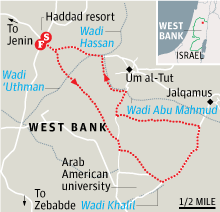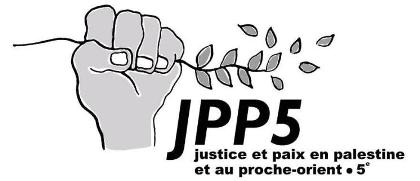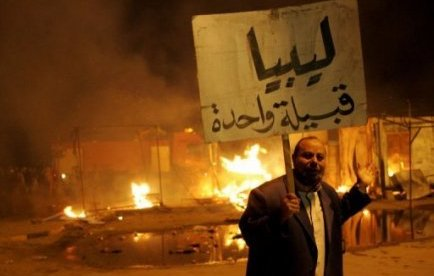Hills, olive groves … and a ferris wheel: hikers find the unexpected in Palestine
With foreign visitors and local people blazing a trail in West Bank, diplomat Stefan Szepesi publishes guide to 25 walks
Mohammed Atari heaved the rock into position, its painted red and white sign marking a seven-mile trail across wheat fields, olive groves and gentle stony hills in the north of the West Bank. "When we started marking walking trails, people were suspicious," he said. They feared the markers signified a new Israeli settlement or military zone."
Walking for pleasure is a concept unfamiliar to most Palestinians. But over the past five years, hikers – mainly foreign diplomats, aid workers and journalists, but also locals – have become a more common sight in the West Bank. Their hikes range from the rolling lush hills and valleys of the north to the dramatic arid desert landscape of the south.
This week sees the publication of Walking Palestine, a guide to 25 walks, the fruits of a four-year project by a Dutch diplomat, Stefan Szepesi. It details tracks, paths and dirt roads; supplies maps and information on historical sites, wildlife and natural attractions; and provides practical details on local guides, parking, public transport, restaurants and places to stay.
 Walking in Jenin.
Walking in Jenin.
Szepesi began walking in the West Bank soon after arriving to work for the EU; he later moved over to the Middle East Quartet. The outings were born of a need to escape the intensity of Jerusalem, but also a desire to get to know Palestinians and their land in a more intimate way than he could from the confines of a diplomatic mission headquarters.
He started exploring the wadis and hills with four friends; the group has now grown to 235 members and organises hikes almost every weekend. "Part of the reason for walking is to meet people," he said last week while hiking part of the trail from Haddad to Jalqamus in the north. Offers of hospitality often slow down a walk considerably, but "I have never regretted accepting the offer of tea or coffee. These unexpected encounters are just wonderful."
The walks in the book avoid Israeli settlements, mainly because the fences that encircle them are also barriers to walking but also because of occasional tensions. In a foreword to the book, Palestinian writer and walker Raja Shehade says: "Many areas of outstanding beauty have been destroyed by the hastily built settlements that stand out as artificial impositions on the delicate features and contours of this ancient land."
The trail from Haddad begins near an unusual landmark: a ferris wheel at a Palestinian tourism resort near Jenin built by businessman Ibrahim Haddad. As well as an amusement park, the centre contains a swimming pool, amphitheatre, hotel and restaurant, much of it incorporating hand-crafted ironwork from the foundry he owns. Against all odds, the resort is a success.
The walk passes through olive, almond and mulberry trees, and fields of rippling wheat. In spring, the ground is covered with wild flowers: anemones, cyclamen, iris, mustard. Much of the vegetation is used in Palestinian cooking and as natural remedies for ailments, said Atari, reeling off evocative local names for plants: tail of the fox, eye of the hyena.
From the highest point of the walk, Mount Carmel – which looks over the Mediterranean– and the ancient city of Nazareth are visible across the Green Line in Israel, as is the West Bank barrier, cutting an ugly scar through the hills and fields.
We diverted from this trail to pick up another route, heading through ploughed fields waiting to be planted with tobacco at the end of the winter, towards the village of Zebabde. With a mixed Christian-Muslim population, it has four churches, two mosques and – welcome at the end of the hike – the Sultan Ibrahim restaurant, serving traditional Palestinian dishes.
"When most people think of the West Bank, they think of occupation and conflict," said Szepesi. "And that's all true, but there's another truth which is not often represented, of people trying to make the best of it. What makes walking in the West Bank so special is that you understand the conflict better, you see the scars on the landscape, but you also see the other face of Palestine."
In the book's introduction, he writes: "Simply put, there is another Palestine from the one filling our television screens."
Atari represents this other Palestine. Aged 34, with a degree in archaeology, he took up guiding after realising there would be few opportunities in his chosen field. "Of course there's a conflict, but I do not want to be a victim. People need to know everything: the bad things, but also the good things."
Walking Palestine, £12.99, Signal Books
http://www.guardian.co.uk/world/2012/mar/19/hikers-west-bank-palestine?CMP=EMCNEWEML1355
Les articles et autres textes publiés ne reflètent pas obligatoirement les opinions du Comité Justice et Paix en Palestine et au Proche-Orient (CJPP5), qui dénie toute responsabilité dans leurs contenus, lesquels n'engagent que leurs auteurs ou leurs traducteurs. Nous sommes attentifs à toute proposition d'ajouts ou de corrections.










